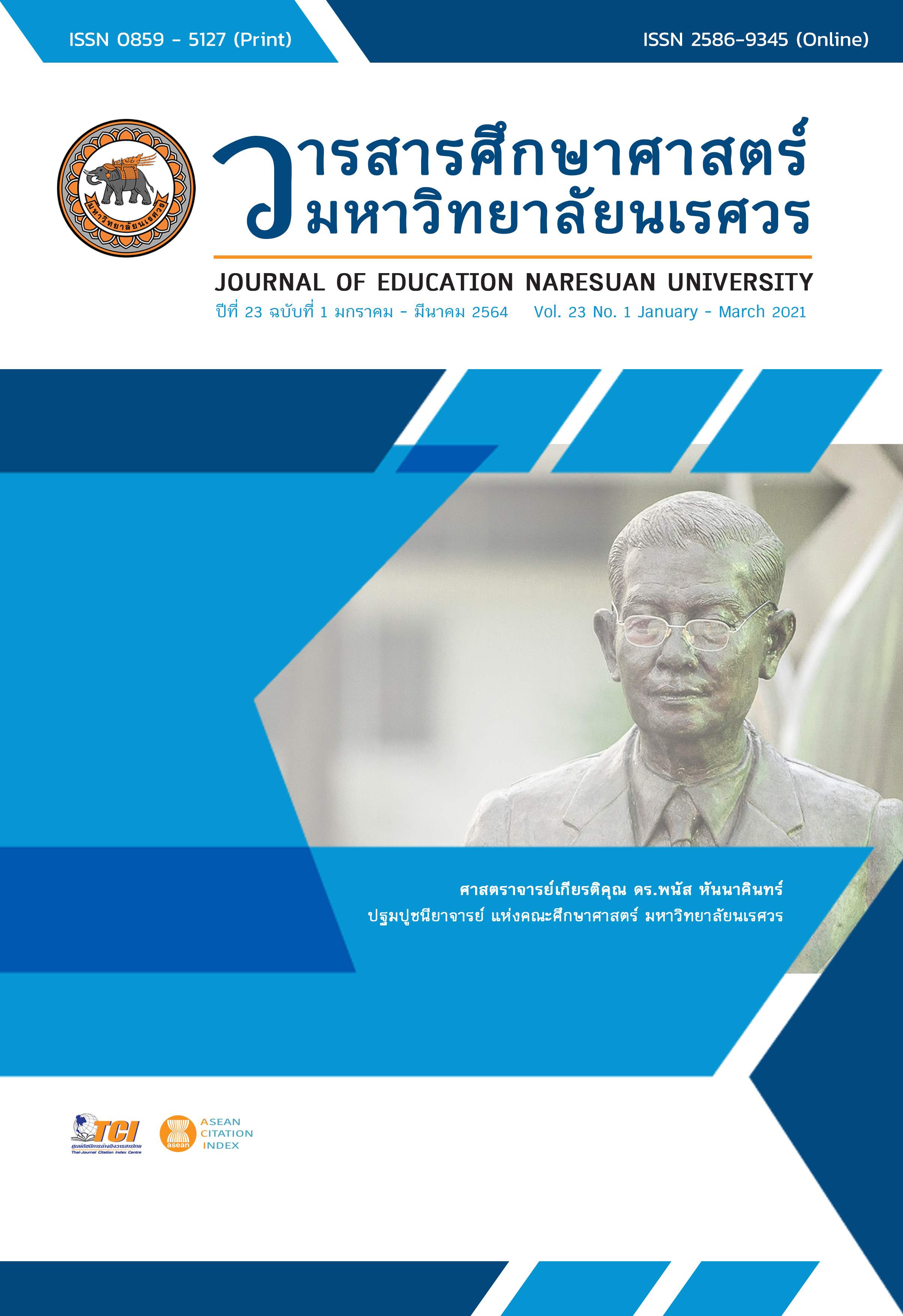SOCIO-SCIENTIFIC ISSUE-BASED APPROACH TO ENHANCE GENETICS LITERACY ON TOPIC OF DNA TECHNOLOGY FOR GRADE 10 STUDENTS แนวทางการจัดการเรียนรู้ตามแนวคิดประเด็นทางวิทยาศาสตร์และสังคมเพื่อส่งเสริมการรู้พันธุศาสตร์ เรื่อง เทคโนโลยีทางดีเอ็นเอ สำหรับนักเรียนชั้นมัธยมศึกษาปีที่ 4
Main Article Content
Abstract
This action research aims to study the learning management of socio-scientific issue-based approach (SSI) for enhancing genetics literacy on topic of DNA technology and effect of SSI approach to enhancing genetics literacy of grade 10 students. The participants were 34 students. The research instruments consisted of 3 lesson plans using socio-scientific issue about application of DNA technology, reflective learning management form, worksheets and the assessment forms of genetics literacy. Data were analyzed using content analysis, average score and percentage. The level of genetics literacy of participants was divided into 3 levels by framework of Abrams et al. (2015) included low, medium, and high. The findings showed that the learning management using SSI approach to enhance genetics literacy on topic of DNA technology, that should choose the socio-scientific issues debated in society and relate to lesson and use role play activity for students to learn vocabularies, principles of genetics and synthesize knowledge into their practice on scientific and social issues. Additionally, the students’ genetics literacy level had progressed after learning through SSI approach from 13.73% to 76.00% (low to high level).
Article Details
The owner of the article does not copy or violate any of its copyright. If any copyright infringement occurs or prosecution, in any case, the Editorial Board is not involved in all the rights to the owner of the article to be performed.
References
Abrams, L. R., Colleen, M., McBride, Gillian, W., Hooker, J. N., Cappella, L. M., & Koehly. (2015). The many facets of genetic literacy: Assessing the scalability of multiple measures for broad use in survey research. PLoS ONE, 10(10), e0141532. DOI:10.1371/journal.pone.0141532
Ackara-aree, N. (2017). Things you may not know about genetics. IPST Magazine, 45(205), 8-13. [in Thai]
Asbury, K., & Plomin, R. (2013). G is for genes: The impact of genetics on education and achievement. Chichester: John Wiley & Sons.
Bossér, U., Lundin, M., Lindahl, M., & Linder, C. (2015). Challenges faced by teachers implementing socio-scientific issues as core elements in their classroom practices. European Journal of Science and Mathematics Education, 3(2), 159-176.
Goltz, H. H., & Acosta, S. (2015). A rare family: Exploring genetic literacy in an online support group. Journal of Family Strengths, 15(2), Article 6. Available at: https://digitalcommons.library.tmc.edu/jfs/vol15/iss2/6
Friedrichsen P. J., Sadler, T. D., Graham, K., & Brown, P. (2016). Design of a socio-scientific issue curriculum unit: Antibiotic resistance, natural selection, and modeling. International Journal of Designs and Learning, 7(1), 1-18.
Kenzie, D. M. (2012). Study linking GM crops and cancer questioned. Retrieved July 28, 2018, from https://www.newscientist.com/article/dn22287-study-linking-gm-crops-and-cancer-questioned
Khammani, T. (2017). Teaching Pedagogy: Knowledge for effective learning management (21st ed.). Bangkok: Chulalongkorn University. [in Thai]
Nuangchalerm, P. (2015). Learning science in the 21st century. Bangkok: Chulalongkorn University. [in Thai]
Lassen, J. (2018). Listened to, but not heard! The failure to represent the public in genetically modified food policies. Public Understanding of Science. DOI: 10.1177/0963662518766286
Osman, E., Jaoude, S. B., & Hamdan, H. (2016). An investigation of Lebanese G7-12 students’ misconceptions and difficulties in genetics and their genetics literacy. Journal of Science and Mathematics Education, 15(1), 1257-1280.
Phillipp, S., Ross, H., Nehm, & Robyn, E. T. (2017). Assessment of genetics understanding under what conditions do situational features have an impact on measures? Science and Education Journal, 26, 1161-1191.
Sadler, T. D., Foulk, J. A, & Friedrichsen, P. J. (2017). Evolution of a model for socio-scientific issue teaching and learning. International Journal of Education in Mathematics, Science and Technology, 5(2), 75-87.
Smith, M., & Steinhauer, J. (2018). Trends in genetics. Call Press Review, 34(1), 1-4.
Steinhauer J. (2018). Why is genetics education so important? Trends in genetics. Call Press Review, 34(1), 1-4.
Stern, F., & Kampourakis, K. (2017). Teaching for genetics literacy in the post-genomic era. Studies in Science Education, 53(2), 193-225.
Sutthirat, C. (2016). 80 innovative learning management that focuses on students (7th ed). Bangkok: Chulalongkorn University. [in Thai]
The Institute for the Promotion of Teaching Science and Technology. (2018). PISA 2018. Bangkok: The Institute for the Promotion of Teaching Science and Technology. [in Thai]
Winstead, R. (2018). What happens if we run out? EuropeanSeed. Retrieved October 1, 2018, from http://european-seed.com/2018/05/what-happens-if-we-run-out/
Zeidler, Sadler, T. D., Simmons, & Howes, E. V. (2005). Beyond STS: A research-based framework for Socio-Scientific issues education. Science Education, 89, 357 – 377.


